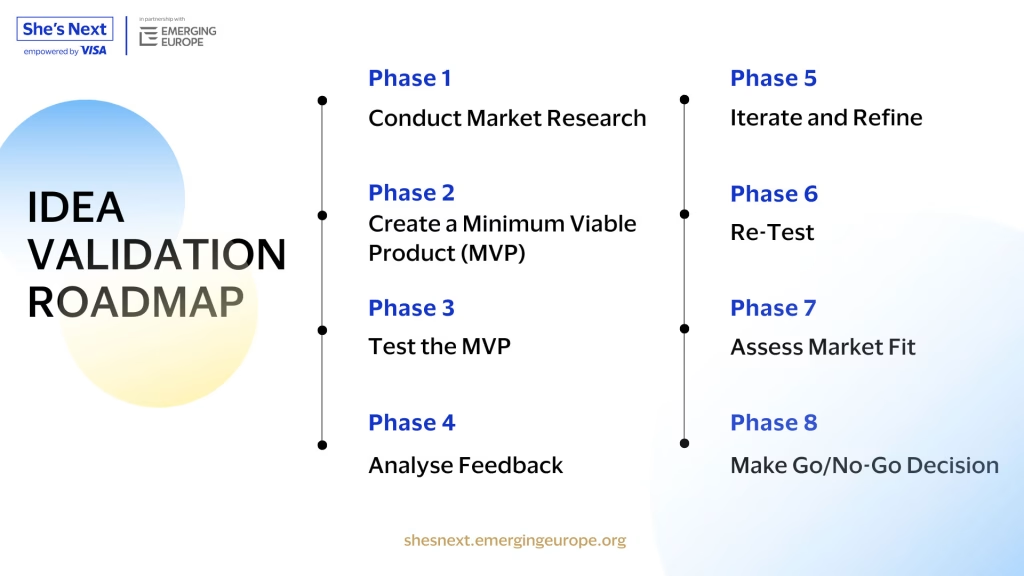
Idea Validation: A Crucial Step in Entrepreneurship
In the realm of entrepreneurship, the process of idea validation is not just a recommendation. It is truly a critical concept that every aspiring business owner must grasp.
It serves as the litmus test to determine the viability of a product or service and it is at this stage you make a Go or No Go decision. Idea validation empowers entrepreneurs to evaluate the future prospects of their offerings without committing significant resources prematurely.
In simple terms, idea validation is the process of testing and proving whether a business idea has a potential to succeed. It consists of eight consecutive steps, involving gathering feedback and analysing market demand. The outcome of the process should be making informed decisions based on the results to ensure that the idea has potential and meets the needs of customers. Those eight steps mentioned earlier are:
Conduct Market Research: Gather information about your target market, including demographics, preferences, and behaviours. Understand existing solutions and competitors in the market.
Create a Minimum Viable Product (MVP): Develop a prototype or basic version of your product or service that addresses the core problem. Keep it simple and cost-effective.
Test the MVP: Collect feedback from potential customers by allowing them to interact with your MVP. Evaluate their reactions, suggestions, and willingness to pay for the solution.
Analyse Feedback: Review the feedback received from testing the MVP. Identify patterns, insights, and areas for improvement.
Iterate and Refine: Based on the feedback, make necessary adjustments to your product or service. Iterate on the MVP to enhance its features, usability, and value proposition.
Re-Test: Once you’ve made refinements, test the updated version with potential customers again. Continuously gather feedback and iterate as needed.
Assess Market Fit: Determine whether there is sufficient demand for your solution in the market. Analyse the level of interest, willingness to pay, and competitive landscape.
Make Go/No-Go Decision: Based on the validation results, decide whether to proceed with the idea or pivot to a different direction. Consider factors such as market demand, feasibility, and potential for success.

Understanding the Significance of Idea Validation
Far beyond being a mere tool, idea validation constitutes a fundamental rule that entrepreneurs must adhere to diligently. The ramifications of neglecting proper idea validation can be dire for a business. Consider the following consequences:
Market Rejection: Failing to align the product or service with the actual needs or preferences of the target market can result in indifference or outright rejection.
Resource Wastage: Inadequate validation may lead to squandering precious resources—be it money, time, or effort—on an unsuccessful product, imposing a financial strain on the business.
Reputation Damage: Introducing an unvalidated idea that flops in the market can tarnish the business’s reputation, posing challenges in rebuilding trust with customers, investors, and stakeholders.
These consequences underscore the critical importance of investing time and effort into comprehensive idea validation to avert such pitfalls.
Market Research: The Bedrock of Idea Validation
At the heart of idea validation lies market research, a key tool for ensuring that a business concept resonates with market needs and shows potential for success.
Market research is the first step in the idea validation process and by delving into it, entrepreneurs gain valuable insights into customer preferences and behaviours, establishing the foundation for effective idea validation.
A wide array of market research methods exists, ranging from surveys and interviews to a more complex ones such as competitor analysis and pilot testing. In other words, these methods vary in complexity and resource requirements. That is why it is crucial to research and select the most suitable combination for your venture’s initial stage.
Idea validation stands as an indispensable tool for entrepreneurs seeking success. Despite the time investment required for idea validation and market research, its benefits far outweigh the costs in the long run. By embracing idea validation as a guiding principle, entrepreneurs can navigate the complexities of the market with confidence and resilience. For a hands-on guide on idea validation watch our “3 Must-do steps for start-up idea validation” video.
New Free Courses — Made for Ambitious Women Entrepreneurs!
It’s time to grow smarter, adapt faster, and take your business global.
Explore two powerful courses available exclusively to She’s Next members:
The Reinvention Masterclass for Start-up Founders
Beyond Borders: Building for Global Success
Enroll today — it’s free!






Responses